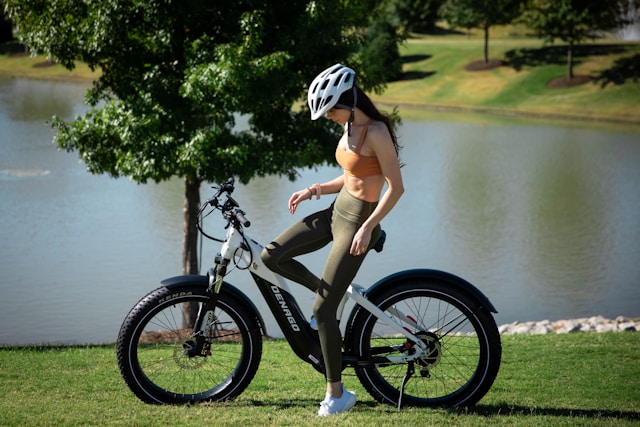Are E-Bikes Worth It? Here’s What Aussie Riders Really Need to Know
Let’s cut straight to the chase — e-bikes are booming. They’re zipping past traffic, popping up on trails and bike paths, and slowly but surely winning over everyday Aussies. But with prices climbing into the thousands and plenty of hype in the mix, one question keeps coming up: are e-bikes actually worth it?
Short answer? For most people — absolutely.
Longer answer? Well, it depends. It depends on how you ride, where you ride, and what you expect from your two-wheeled companion.
Whether you’re thinking about ditching the car, getting fitter, or just keen on cruising up hills without breaking into a sweat, this guide will walk you through the real pros and cons of e-bikes — in plain, no-nonsense Aussie terms.
⚡ First Up — What Even Is an E-Bike?
If you’re still catching up, an electric bike (or e-bike) is basically a regular bicycle with a battery and an electric motor.
No, it’s not a motorbike. You still pedal — the motor just gives you a boost. Like having a really strong tailwind… or invisible legs helping you push.
There are different kinds, but most e-bikes in Australia are pedal-assist — meaning the motor only kicks in when you pedal. Some models also have a throttle (though these are trickier legally), but pedal-assist is the most common — and road-legal — type you’ll find.

✅ The Perks: Why More Aussies Are Going Electric
Let’s get into the good stuff first. Why are e-bikes everywhere these days? It’s not just about being trendy — there are practical, everyday reasons why more people are hopping on the e-bike bandwagon.
1. Effortless Commuting
Tired of sweating through your clothes on the ride to work? An e-bike makes cycling to the office doable — even if you’re not Tour de France fit. You’ll still get exercise, but arrive fresh and ready instead of red-faced and puffing.
2. Crush Those Hills
Let’s be honest, Aussie terrain can be brutal — especially in places like Hobart, the Adelaide Hills, or parts of Sydney. With a 250W or 500W motor behind you, those climbs feel more like gentle ramps than torturous slogs.
3. Carry More With Less Effort
Got kids? Groceries? A work bag full of gear? No worries. E-bikes make carrying cargo a breeze. Some models even come with built-in racks or can tow trailers.
4. Ride Longer, Explore More
That extra push means you’ll go further than you ever would on a normal bike. Perfect for exploring local bike trails or getting out on the weekend without worrying if you’ve got the stamina to get back.
5. Built-in Lighting = Safer Riding
Most e-bikes come with integrated lights — headlight and taillight powered by the main battery. You’re more visible to cars and can comfortably ride after dark. It’s a little feature, but a big deal for safety.
6. A Fun, Easy Way to Stay Active
Let’s face it — riding an e-bike is just fun. You feel like a superhero with every pedal. It gets you moving, gets your heart rate up, and gets you outdoors. It’s exercise without the intimidation.

🚧 But… They’re Not Perfect
It’s not all sunshine and tailwinds. E-bikes come with a few real drawbacks you should know before buying one.
1. They’re Heavy
With that motor and battery onboard, most e-bikes are heavier than regular bikes — often by 10–15kg or more. That’s fine while riding, but if you need to carry your bike up stairs (say, in an apartment or onto a train), you might start swearing under your breath.
2. They’re Expensive
Let’s talk dollars. A decent e-bike will set you back anywhere from $1,500 to $5,000+. Yes, you can find cheaper models, but quality varies wildly. And unlike cheap bikes from big box stores, a good e-bike is an investment — but not everyone has that kind of spare cash lying around.
3. Theft Risk
Expensive + heavy = target for thieves. You can’t just pop it inside easily, and leaving it locked up in public can be nerve-wracking. A strong lock is a must, and ideally somewhere secure to store it when not in use.
4. Charging and Range Anxiety
Most batteries take 4–6 hours to charge, and you’ll typically get 50–100km per charge, depending on your assist level, terrain, and weight. If you forget to plug it in? You’ll still have a bike — but now it’s a really heavy one with no help.

🔌 Tech Talk: What’s Under the Hood (or Frame)?
In Australia, the legal limit for road use is 250W, unless you’re riding on private property.
That might sound low, but trust me — 250W is more than enough for most riders. These motors help you get up to 25km/h with assistance, and after that, it’s all you.
Battery-wise, you’ll see ranges like 500Wh or 15Ah — which roughly translates to how far you can ride before needing a top-up. Again, the more assistance you use (higher levels = more boost), the quicker the battery drains.
🏠 Apartment Dwellers: Think Twice?
This is where things get tricky. If you live in a flat or unit with no lift and no secure storage, owning an e-bike can be a pain.
Dragging a 25kg machine up a narrow staircase is not fun. And leaving it locked outside? Risky.
Some e-bikes come with removable batteries, which you can charge inside while keeping the bike locked up. But still — storage is something you really need to think about if you’re short on space.

💰 Are E-Bikes Worth the Cost?
This is the big question. Is dropping two grand on a bike really a smart move?
Well, let’s break it down:
If you use it to:
- Replace car trips
- Commute to work
- Do weekend errands
- Get healthier
- Avoid public transport
… then yes, an e-bike can absolutely pay for itself over time.
Think of the petrol you’ll save. Parking fees. Public transport tickets. Even gym memberships. Over a year or two, those savings add up — and that’s before you factor in the time saved sitting in traffic.
Plus, let’s not forget: it’s better for the planet. No emissions. No noise. Just you, a bit of sunshine, and a whole lot of breeze.
🌱 The Environmental Upside
E-bikes aren’t just good for your back pocket — they’re better for the Earth too.
Compared to cars (even electric ones), e-bikes use a tiny fraction of the energy. They produce no emissions while riding, reduce congestion, and have a far smaller manufacturing footprint.
If you’re serious about reducing your carbon footprint, riding an e-bike for local trips is one of the easiest changes you can make.
🔐 Security Tips: Keeping It Safe
Because e-bikes are more valuable (and more desirable), they need better protection. Here are a few quick tips:
- Invest in a proper D-lock or folding lock. Don’t skimp on security.
- Remove the battery when parking long-term — it’s a theft deterrent.
- Park in well-lit areas, preferably with CCTV.
- Consider insurance, especially if you’re using it for commuting.

🧰 Maintenance: What You Need to Know
The good news? E-bikes don’t require a heap of extra maintenance. You’ll want to:
- Keep the chain clean and lubricated
- Check tyre pressure regularly
- Charge the battery properly (don’t leave it dead for weeks)
- Get it serviced every 6–12 months, depending on use
The electrical bits are usually sealed and don’t need much hands-on work. Just keep an eye out for software updates if your model has a digital display or smart features.
🎯 Final Verdict: Should You Buy One?
Let’s bring it home.
E-bikes aren’t for everyone. If you only ride once a month, or never go further than the corner shop, a standard pushie might do just fine.
But if you’re commuting, doing longer rides, carrying cargo, or just want to ride more without the pain, then an e-bike can be a total game-changer.
Yes, they’re heavier. Yes, they’re pricier. But in return, you get a better ride, a cleaner commute, and a whole new way to explore your surroundings.
So, are e-bikes worth it?
For most Australians? Absolutely.





